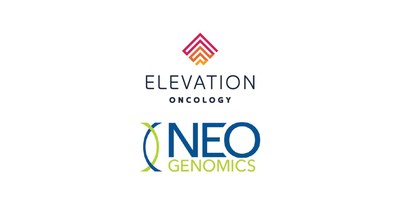Elevation Oncology and NeoGenomics Announce Collaboration to Expand Genomic Testing for NRG1 Fusions Across Solid Tumors in Support of the Phase 2 CRESTONE Study
NeoGenomics (NASDAQ:NEO) has partnered with Elevation Oncology to enhance patient identification for the Phase 2 CRESTONE study focusing on solid tumors with NRG1 gene fusions. NRG1 fusion incidence is estimated at 0.2% across all solid tumors, making efficient detection crucial. NeoGenomics conducts over 50,000 next-generation sequencing tests annually, which will aid in matching patients to targeted therapies. The collaboration aims to improve precision oncology for patients, ensuring actionable treatment opportunities in ongoing clinical trials.
- Collaboration aims to enhance patient identification for Phase 2 CRESTONE study.
- NeoGenomics performs over 50,000 next-generation sequencing tests annually.
- NRG1 gene fusions are rare, with an overall incidence of only 0.2% in solid tumors.
Insights
Analyzing...
NEW YORK and FORT MYERS, Fla., March 16, 2021 /PRNewswire/ -- Elevation Oncology, a clinical stage biopharmaceutical company focused on the development of precision medicines for patients with genomically defined cancers, and NeoGenomics, Inc. (NASDAQ:NEO), a leading provider of cancer-focused genetic testing services and global oncology contract research services, announced today a collaboration to enhance identification of patients with any solid tumor harboring an NRG1 fusion who may be eligible for enrollment in the Phase 2 CRESTONE study. NeoGenomics is a leading provider of next-generation sequencing (NGS) performing more than 50,000 NGS tests per year.
NRG1 gene fusions are oncogenic driver alterations that have recently been identified in over 10 solid tumor types, with an overall estimated incidence of
"Our collaboration with Elevation Oncology reflects our shared pursuit of matching cancer patients to clinical trials and therapies that are precisely targeted to their unique tumor types and genomic biomarkers," said Douglas M. VanOort, Chairman and Chief Executive Officer of NeoGenomics. "Through cross-industry collaborations, we enable greater efficiency in the development and delivery of the latest advancements in both diagnostics and targeted therapies. Together, we work towards a future where every patient living with cancer has the opportunity to benefit from precision medicine."
As part of its comprehensive oncology test menu, NeoGenomics offers a variety of gene fusion panels that leverage RNA-based NGS to detect translocations and fusions with known and novel fusion partners across all solid tumors, including actionable gene fusions such as in ALK, BRAF, FGFR, NRG1, NTRK, PDGF, RET, and ROS1. In addition to all solid tumor panels, targeted panels are available in tumor types where gene fusions are commonly enriched:
- Lung NGS Fusion Panel (Complete or Limited)
- Cholangio/Pancreatic Carcinoma NGS Fusion Panel
- Prostate NGS Fusion Panel
- Thyroid NGS Fusion Panel
- Targeted Solid Tumor NGS Fusion Panel
- Universal Solid Tumor NGS Fusion Panel
RNA-based sequencing is the most sensitive detection method for structural variants that span large intronic regions, such as those leading to NRG1 gene fusions, which may not be detectable by most DNA-based sequencing techniques reliant on short-read methods. In addition, the use of RNA-based NGS furthers the scientific understanding of gene fusions by enabling full characterization of gene fusion partners and nucleotide-level resolution of fusion junctions.
"Accurate and widespread identification of gene fusions is critical to ensure patients can be matched to the growing number of approved and investigational precision therapies for these key oncogenic drivers," said Shawn Leland, PharmD, RPh, Founder and CEO of Elevation Oncology. "We are pleased to partner with NeoGenomics to ensure that across any solid tumor, each positive NRG1 fusion test result has the potential to be met with an actionable therapeutic opportunity in our Phase 2 CRESTONE study."
Patients and physicians can learn more about the CRESTONE study at www.nrg1fusion.com or on www.ClinicalTrials.gov under the NCT number NCT04383210.
References:
- Jonna S et al., Detection of NRG1 Gene Fusions in Solid Tumors. Clin Cancer Res. 2019 Aug 15;25(16):4966-4972.
- Drugs@FDA Database, Accessed 2/15/2021
About NeoGenomics, Inc.
NeoGenomics, Inc. specializes in cancer genetics testing and information services. The Company provides one of the most comprehensive oncology-focused testing menus in the world for physicians to help them diagnose and treat cancer. The Company's Pharma Services Division serves pharmaceutical clients in clinical trials and drug development.
NeoGenomics is committed to connecting patients with life altering therapies and trials. We believe that, together, with our partners, we can help patients with cancer today and the next person diagnosed tomorrow. In carrying out these commitments, NeoGenomics adheres to all relevant data protection laws, provides transparency and choice to patients regarding the handling and use of their data through our Notice of Privacy Practices, and has invested in leading technologies to ensure the data we maintain is secured at all times.
Headquartered in Fort Myers, FL, NeoGenomics operates CAP accredited and CLIA certified laboratories in Fort Myers and Tampa, Florida; Aliso Viejo, Carlsbad and San Diego, California; Houston, Texas; Atlanta, Georgia; Nashville, Tennessee; and CAP accredited laboratories in Rolle, Switzerland, and Singapore. NeoGenomics serves the needs of pathologists, oncologists, academic centers, hospital systems, pharmaceutical firms, integrated service delivery networks, and managed care organizations throughout the United States, and pharmaceutical firms in Europe and Asia. For additional information about NeoGenomics, visit http://www.neogenomics.com/.
About Elevation Oncology
Elevation Oncology is founded on the belief that every patient with cancer deserves to know what is driving the growth of their disease and have access to therapeutics that can stop it. We aim to make genomic tests actionable by selectively developing drugs to inhibit the specific alterations that have been identified as drivers of disease. Together with our peers we work towards a future in which each unique test result can be matched with a purpose-built precision medicine to enable an individualized treatment plan for each patient. Our lead candidate, seribantumab, inhibits tumor growth driven by NRG1 fusions and is currently being clinically tested in the Phase 2 CRESTONE study for patients with tumors of any origin that have an NRG1 fusion. Details on CRESTONE are available at www.NRG1fusion.com. For more information visit www.ElevationOncology.com.
About Seribantumab and NRG1 Gene Fusions
Seribantumab is a fully human IgG2 monoclonal antibody that binds to human epidermal growth factor receptor 3 (HER3). HER3 is traditionally activated through binding of its primary ligand, neuregulin-1 (NRG1). The NRG1 gene fusion is a rare genomic alteration that combines NRG1 with another partner protein to create chimeric NRG1 "fusion proteins". The NRG1 fusion protein is often also able to activate the HER3 pathway, leading to unregulated cell growth and proliferation. Importantly, NRG1 gene fusions are mutually exclusive with other known driver mutations and are considered a unique oncogenic driver event essential for tumor cell survival.
NRG1 fusions have been identified in a variety of solid tumors, including lung, pancreatic, gallbladder, breast, ovarian, colorectal, neuroendocrine, and sarcomas. In preclinical experiments, seribantumab prevented the activation of HER3 signaling in cells that harbor an NRG1 gene fusion. In addition to extensive nonclinical characterization and testing, seribantumab has been administered to 847 patients across 12 Phase 1 and 2 studies, both as a monotherapy and in combination with various anticancer therapies. Seribantumab is currently being clinically tested in the Phase 2 CRESTONE study for patients with solid tumors of any origin that have an NRG1 fusion.
About the CRESTONE Study
Clinical Study of Response to Seribantumab in Tumors with Neuregulin-1 (NRG1) Fusions. CRESTONE is a Phase 2 tumor-agnostic "basket trial" of seribantumab in patients with any solid tumor that harbor an NRG1 fusion. The primary objective of the study is to describe the anti-tumor activity and safety of seribantumab specifically in patients with an NRG1 gene fusion. CRESTONE offers a clinical trial opportunity for patients with advanced solid tumors who have not responded or are no longer responding to treatment. Patients are encouraged to talk to their doctor about genomic testing of their tumor. CRESTONE is open and enrolling today in the US. For more information visit www.NRG1fusion.com.
For further information, please contact:
Elevation Oncology
Name: David Rosen, Argot Partners
Phone: +1 (716) 371-1125
Email: media@ElevationOncology.com
NeoGenomics
Doug Brown
Chief Strategy and Corporate Development Officer
T: 239.768.0600 x2539
M: 704.236.2064
doug.brown@neogenomics.com
Charlie Eidson
Manager of Investor Relations and Manager of Strategy and Corporate Development
T: 239.768.0600 x2726
M: 952.221.8816
charlie.eidson@neogenomics.com
![]() View original content to download multimedia:http://www.prnewswire.com/news-releases/elevation-oncology-and-neogenomics-announce-collaboration-to-expand-genomic-testing-for-nrg1-fusions-across-solid-tumors-in-support-of-the-phase-2-crestone-study-301248140.html
View original content to download multimedia:http://www.prnewswire.com/news-releases/elevation-oncology-and-neogenomics-announce-collaboration-to-expand-genomic-testing-for-nrg1-fusions-across-solid-tumors-in-support-of-the-phase-2-crestone-study-301248140.html
SOURCE Elevation Oncology & NeoGenomics








